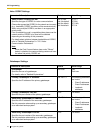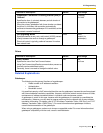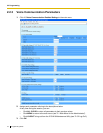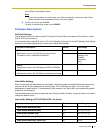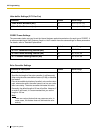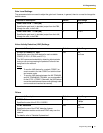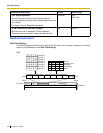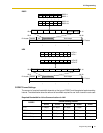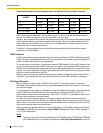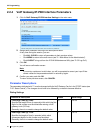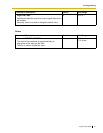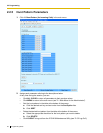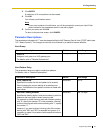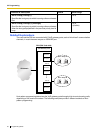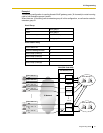
2.2 Programming
24 Programming Guide
Required Bandwidth for Voice Communication via WAN (PPP: Point-to-Point Protocol)
When assessing your bandwidth requirements, keep in mind that the longer the packet sending
interval, the smaller the amount of required bandwidth, and vice versa.
However, also consider that the shorter the packet sending interval, the clearer the expected speech
quality, because delays in packet transmissions will be small. When the packet sending interval is
long, delays are more likely to occur, resulting in overall degradation in speech quality with more
pauses and loss in voice communications.
Therefore, it is recommended that you select the shortest packet sending interval that network
bandwidth can accommodate.
DTMF Detection
A VoIP network does not guarantee accurate end-to-end transmission of DTMF signals because the
DTMF signals are coded/decoded during VoIP communications, in the same way as voice signals. In
addition, packets can get lost during transmission.
To compensate for this problem, it is possible to enable DTMF detection for the VoIP Gateway Card
to carry out accurate end-to-end DTMF relay over the network. Upon detecting DTMF signals from
the PBX, the card encodes the signals and then sends them to the destination, instead of as voice
signals. Then at the destination, the card regenerates the DTMF signals from the received encoded
signals, and then sends them to the PBX.
Note that when this feature is enabled, the sending of packets is delayed by approximately 30 ms.
Therefore, it is recommended that you disable this feature unless DTMF detection is necessary.
FAX Signal Detection
When sending fax signals using a CODEC other than G.711, the signals cannot be received
accurately at the destination because they are coded/decoded over the VoIP network, in the same
way as voice signals.
To compensate for this problem, it is possible to enable fax detection for the card. Upon detecting fax
signals (CED tones) from the PBX, the card automatically switches the CODEC to G.711 to
communicate with the card at the destination. With the G.711 CODEC, it is possible to assure error-
free fax communications to a certain extent.
To further assure fax communications, it is strongly recommended that the communicating fax
machines be equipped with the ECM (Error Correction Model) feature, an automatic error correction
feature. When, for example, the receiving fax machine detects errors in transmission, it can have the
sending fax machine resend the relevant data.
When using the fax detection feature, the communicating cards must share the same value (either
"G.711Mu" or "G.711A") for the parameter Voice CODEC Priority (see "Voice CODEC Settings" in
"2.2.2 H.323 Parameters").
Notes
• To carry out fax communications between the KX-TDA0490 and KX-TDA5480/KX-TDA0484
VoIP Gateway Cards, it is necessary to disable the "FAX High Reliable Method" for the KX-
CODEC
Packet Sending Interval
20 ms 30 ms 40 ms 60 ms 90 ms
G.711 84 kbps 77.3 kbps 74 kbps 70.7 kbps —
G.729A 28 kbps 21 kbps 18 kbps 14.7 kbps —
G.723.1 5.3 kbps — 18.7 kbps — 12 kbps 9.8 kbps
G.723.1 6.3 kbps — 19.7 kbps — 13.1 kbps 10.8 kbps



